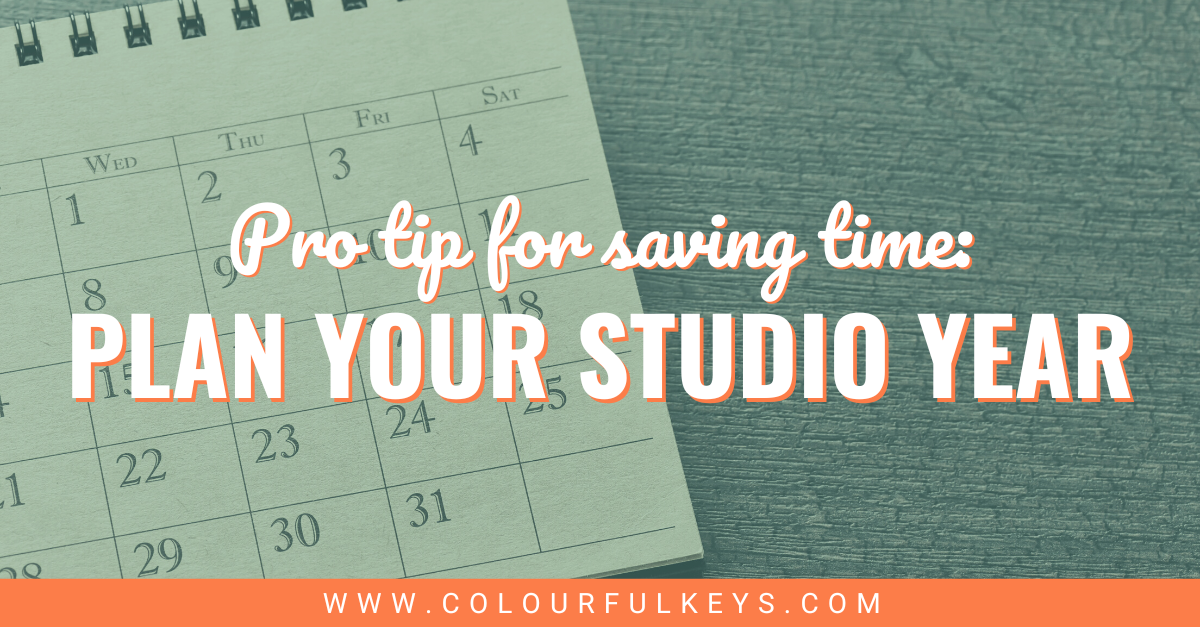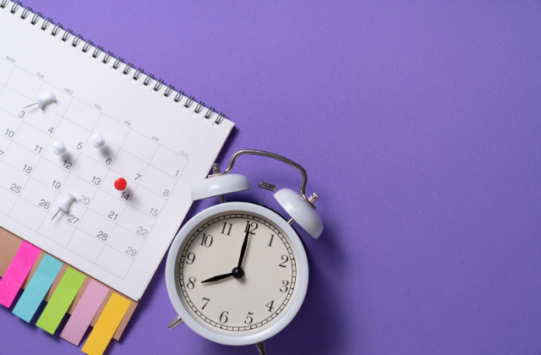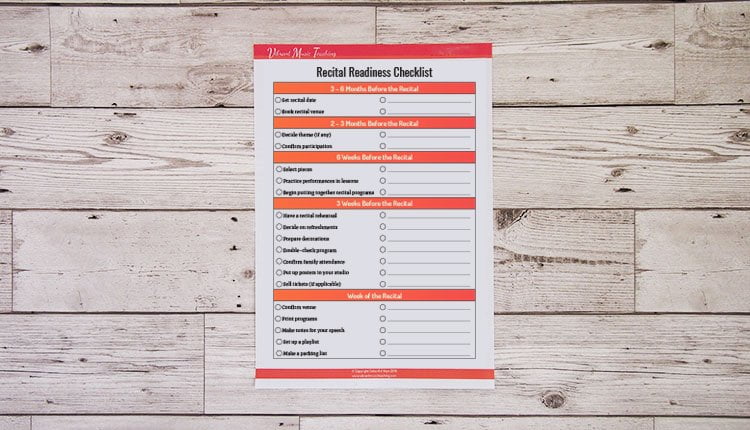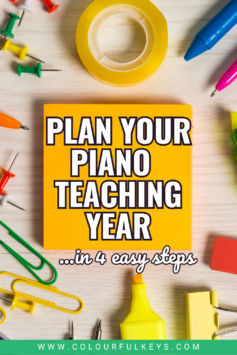
This blog post about how to plan your piano studio year was written by Rosemarie Penner. Rosemarie is an analytical creative…plus an online piano teacher and composer at “Must Love Music”. She loves to make learning simple, fun and interactive. When not writing articles (like this one), she enjoys reading and playing video games. For creative ideas and resources, visit Must Love Music.
Running a piano studio involves a lot of moving parts. There are recitals, festivals, group lessons, weekly lessons…not to mention the admin and planning that goes with all these things. A mere glance at the calendar can be an overwhelming, mind-boggling reality check.

While it may seem unimaginable to plan your entire piano studio calendar for the year in one go, the process is actually quite simple and can make a huge difference.
What “No Plan” Looks Like
I used to struggle with wanting to do too much throughout the year – mostly because I underestimated what was realistic to accomplish.
Because my little ones were running around, it always seemed that everything I tried to do took far longer than I had imagined. And as much as I loved having our twins sit on my lap before saying good night, I didn’t want to face the work that was sitting on my desk. While I had an overall studio concept, all the admin tasks that went with it were left to chance.
So, after one too many nights sitting at my desk frantically writing a studio newsletter or finishing a project we needed for lessons the next day, I thought, “Enough is enough.”
Plan once. Save time.
By organising your piano studio year all at once, you actually save time – and a whole lot of extra headaches.
Just imagine: no more late nights hurrying to get things done PLUS more time for family and self-care. (Can you feel your shoulders drop as the stress melts away?)
Having a plan for the year – at the beginning of the year – is essential to less stress later.
Setting aside a day (or possibly 2) for creating the calendar plan for your piano studio year may seem like a luxury. But a pre-planning approach can save you way more time than winging it throughout the year. This strategy doesn’t have to be complicated or fancy. In fact, the simpler the better.
Step 0: Paper or Digital?
Before you can start planning, grab a piece of paper and pencil, or create a digital spreadsheet using Excel, Numbers or Google Sheets. (I’m a fan of using a spreadsheet because me and paper tends to lead to a LOT of eraser bits everywhere as I move things around.)

If you’re using paper, please for the love of all that is good in this world, don’t use a pen! Not even the fantastic erasable pens. You’ll regret it. Take it from someone who has learnt the hard way. 🥴
Pro tip: Use a pencil now, and make it look pretty later (or never!).
Step 1: Big-Picture Stuff
Once you’ve decided on paper or digital, start your spreadsheet by putting in the months and weeks along the top or side.
Now fill in important dates that will affect your studio calendar for the year. Mark the dates your studio will be closed. This includes:
- Winter, spring and summer breaks
- Holidays when you don’t teach, as well as your own children’s school days off (check school websites if needed).
- Conferences/Professional Development (If you’re not sure of the specific dates for these, check their websites or estimate the dates based on prior years.)
Placing these dates in first honours the outside commitments in your life. In addition, it saves time later since you aren’t scrambling to change your schedule to accommodate your children’s or students’ schedules or to finish time-intensive projects.
Once you’ve filled in those important dates that influence your studio calendar, you can determine your teaching weeks for the year and mark those in your calendar.
Step 2: The Nitty Gritty
Now that you have the big picture, it’s time to start thinking about timelines for studio events.
Group lessons, recitals, registration, oh my! 😱
Each of your studio events has multiple moving parts. Looking at the whole year at once ensures you don’t have too many things happening at the same time. You’ll also better manage your time when working on projects because you’ll be able to space them out appropriately.
Group Lessons
In my studio, we have 5 group lessons throughout the academic year. Individual lessons are cancelled during those weeks. Not only do my students enjoy getting together, but it gives me a chance to attend conferences, work on bigger projects or take a break if I need one.
Think about situations like these when scheduling group lessons:
- How many group lessons, masterclasses and/or piano parties do you want to slate per year?
- Will you offer private lessons during those weeks?
- Which students will attend these? For students that don’t attend (i.e. adult students), what happens?
- How much prep time do you need for each group lesson?
When designing your piano studio calendar for the year, look at the weeks it logistically makes sense to have group workshops and distribute them across the year. Additionally, be sure to consider your students’ needs and tendencies as you schedule these dates.

For my studio, I know my students will be in vacation mode the week before winter, spring and summer breaks so those weeks automatically become group lessons.
Recital Planning
Ah, recitals. You and I both know the to-do list for recitals tends to be exhaustive. And that recital-planning checklist doesn’t even include ensuring students master their songs in time! (For my studio’s spring recital, students compose a song which adds another layer to recital prep.)
Recital time is a big consideration when mapping out your piano studio year. There are periodic due dates spanning months that can’t be fixed with a few last-minute, late-night crunch sessions.
Buy some time – and future headaches – by putting a lot of thought into performance dates on your annual calendar creation day.
Logistics
Once you pick a recital date, work backwards to see if there’s enough time for all the logistical work to be done in time. For example, when I did in-person recitals, I liked to contact the venue about 10 months in advance. So setting a recital date 4 months from now simply wouldn’t be do-able.
Recital Piece Preparation
Aside from logistics, you have to take into account the time needed for your students to prepare their pieces.
I have some students that prefer to pick and work on a challenging piece in the summer before the next year’s spring recital. They know their personal learning challenges, and have made the decision to start very early so there’s less stress. (This mindset tends to be the exception rather than the rule in my studio.)
But other students would be bored to tears working on the same song for more than 2 months. Therefore, we adjust accordingly and have a shorter time frame for learning and polishing their recital pieces.
No matter what learning style your students prefer, determine the date your students will choose recital pieces and add it to your annual calendar. This date should allow time for you to find appropriately-levelled music, as well as enough time for students to master and polish their pieces.
Not only should you include the recital “piece-picking” date in your piano studio plan for the year, it’s a good idea to add dates for:
- The week students at each level (i.e. elementary, intermediate, advanced) should start learning their performance pieces
- Final due date for piece mastery
Need help working out the timing for your recital? Nicola has a great worksheet to help you do just that. It’s usually available exclusively for members of Vibrant Music Teaching, but if you enter your info below, Nicola’s team will send you a copy for free as a thank you for following her blog.

Subscribe to updates and get the Recital Readiness Checklist
Enter your details to subscribe to the newsletter for piano teachers with information, tips and offers.
I hate spam as much as you do! I’ll only send you information that’s directly relevant to music teachers and you can unsubscribe at any time.
Members can access the checklist from the VMT Library. Not a VMT member? You’re missing out on so much! Take a tour and join today.
Annual Re-registration
Registration isn’t just a necessary evil. It’s crucial to the continued success of your piano studio, so it needs to have a place in your annual plan.
Ask questions like these to decide the best time for registration:
- At what point in the year are parents most likely to feel excited about your studio, and want to make sure they keep their child’s spot for the next year?
- When is it “too early” to start enrolment and likely to annoy your piano families?
- How long can you wait to start registration without leaving you scrambling heading into holidays?
There’s no perfect answer for any of these questions.
However, when creating your annual studio calendar, be certain to take into account these types of projects that fall onto your shoulders alone – not just the ones reliant on your students.
Other Events
If your studio routinely participates in other events like exams or festivals, make sure to enter the dates when making your calendar. And much like the recital planning, look at when students will need to choose songs and start preparing.
Step 3: How much is too much?
Be realistic about what you and your studio families can handle. Having too many studio events in a row can be stressful on everyone. And taking on loads of projects can lead to burnout for you.
This is the part when mapping out your year can get a little messy. If you were using a pencil, get ready for eraser bits to fly!

Look at your grand scheme for the year and think about things like:
- Which months and weeks do you have more family or personal responsibilities than usual? (During those times, keep studio projects and commitments very light.)
- What extra expectations will students and clients have each month? (Spread those tasks out over the year so they don’t feel burnt out.)
- Have you built in enough time to complete projects or get ready for events?
The answers to these questions will look different year to year. Whether it’s kids growing up, ageing parents, prioritising your health or just doing life, the amount you can handle will change.
If you need to tackle fewer projects or drop an event or two in the coming year, no judgement.
You tried something last year that was too much for studio families? Don’t beat yourself up about it. Just let it go and leave it off this year’s calendar.
Step 4: Adapting to the Times
You now have a fantastic overview of what’s happening in your studio. Now the year will go perfectly, right? Not quite.
The whole point of setting aside an annual calendar-making day is to take the major scheduling decisions off your plate. But life has a way of happening, and there are those rare occasions when the best laid plans need a little tweaking.
Monthly and Weekly Check-Ins
At the end of each month, take a look at your annual piano studio plan. Are you, your students and clients on track for events coming up?
In order to ensure everyone is up to date, I go back each month and week to my annual plan so I know if there are projects or tasks I need to add to my weekly schedule.
To see what this looks like on my Google Calendar, see the video below.
Using this procedure has kept things inherently positive for me, which is important when the to-do list never really shrinks. It also ensures that my weekly preparation is a few minutes versus the hours it used to take.
By doing weekly and monthly calendar checks, I’m able to see when/if things have gone awry and am able to adjust accordingly.
Student Reminders
On student practice assignment pages, I ensure there are reminders of upcoming studio events. These range from:
- Starting new pieces
- Dates of group lessons
- Events parents may need to be involved with (e.g. recording week or student-led conferences)
Student practice assignment pages can also serve as helpful communication tools to let parents know when scheduling adjustments have to be made.

What’s your favourite strategy for planning your studio’s annual calendar?
Let me know in the comments below. 🙂
For more help planning and running your music teaching studio business, check out Nicola’s page devoted entirely to business resources just for you.